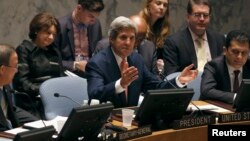NEW YORK —
U.S. Secretary of State John Kerry has called on all parties to end their support for armed rebel groups in the eastern Democratic Republic of Congo.
Secretary Kerry made the call at his United Nations debut as the top U.S. diplomat Thursday, chairing a high-level U.N. Security Council session on the Great Lakes region and the DRC.
He told the meeting that he is deeply concerned about recent reports of resumed external support to the M23 rebel group, and reports of collaboration with the Rwandan Hutu rebel group in the eastern DRC, known as the FDLR.
“I want to be emphatic here today: all parties must immediately end their support for armed rebel groups," he said. "All governments must hold human rights violators and abusers accountable. We must end the era of impunity.”
Earlier this week, Human Rights Watch issued a report saying Rwanda has provided ammunition, food, and training to M23 rebels and allowed its leaders to recruit inside Rwanda, including among demobilized Rwandan soldiers.
Meanwhile, Rwanda accused U.N. peacekeepers of backing alleged collaboration between the DRC army and the FDLR.
While Kerry did not directly name Rwanda, he urged regional actors to exercise restraint and return to a constructive path, moving forward to address the root causes of regional conflict and permanently resolve it.
U.N. Secretary-General Ban Ki-moon also expressed concern about recent fighting and called on the signatories to February's Peace, Security and Cooperation Framework to work positively with each other in order to endorse the document this September on the margins of the annual General Assembly debate.
Ban urged countries to support this goal through all the means available, including sanctions for spoilers.
“I call on the international community to use all tools from international criminal prosecution to sanctions regimes to development assistance,” he said.
Rwandan Foreign Minister Louise Mushikiwabo appeared to ignore allegations that her government supports armed groups in the eastern DRC. She said Rwanda is “eager” to do its part to help implement the Framework agreement, and noted Rwanda's cooperation in helping facilitate the handover of wanted warlord Bosco Ntaganda to the International Criminal Court when he surrendered at the U.S. Embassy in Kigali in March.
In an effort to stem the violence, the United Nations recently added a robust specialized force to its already huge peacekeeping mission in the eastern Congo. The so-called intervention brigade is tasked with neutralizing armed groups.
The U.N. will also soon start using unarmed drones to monitor the DRC's lengthy eastern border. On the development side, the World Bank has pledged $1 billion to enhance infrastructure and encourage trade.
Secretary Kerry made the call at his United Nations debut as the top U.S. diplomat Thursday, chairing a high-level U.N. Security Council session on the Great Lakes region and the DRC.
He told the meeting that he is deeply concerned about recent reports of resumed external support to the M23 rebel group, and reports of collaboration with the Rwandan Hutu rebel group in the eastern DRC, known as the FDLR.
“I want to be emphatic here today: all parties must immediately end their support for armed rebel groups," he said. "All governments must hold human rights violators and abusers accountable. We must end the era of impunity.”
Earlier this week, Human Rights Watch issued a report saying Rwanda has provided ammunition, food, and training to M23 rebels and allowed its leaders to recruit inside Rwanda, including among demobilized Rwandan soldiers.
Meanwhile, Rwanda accused U.N. peacekeepers of backing alleged collaboration between the DRC army and the FDLR.
While Kerry did not directly name Rwanda, he urged regional actors to exercise restraint and return to a constructive path, moving forward to address the root causes of regional conflict and permanently resolve it.
U.N. Secretary-General Ban Ki-moon also expressed concern about recent fighting and called on the signatories to February's Peace, Security and Cooperation Framework to work positively with each other in order to endorse the document this September on the margins of the annual General Assembly debate.
Ban urged countries to support this goal through all the means available, including sanctions for spoilers.
“I call on the international community to use all tools from international criminal prosecution to sanctions regimes to development assistance,” he said.
Rwandan Foreign Minister Louise Mushikiwabo appeared to ignore allegations that her government supports armed groups in the eastern DRC. She said Rwanda is “eager” to do its part to help implement the Framework agreement, and noted Rwanda's cooperation in helping facilitate the handover of wanted warlord Bosco Ntaganda to the International Criminal Court when he surrendered at the U.S. Embassy in Kigali in March.
In an effort to stem the violence, the United Nations recently added a robust specialized force to its already huge peacekeeping mission in the eastern Congo. The so-called intervention brigade is tasked with neutralizing armed groups.
The U.N. will also soon start using unarmed drones to monitor the DRC's lengthy eastern border. On the development side, the World Bank has pledged $1 billion to enhance infrastructure and encourage trade.




